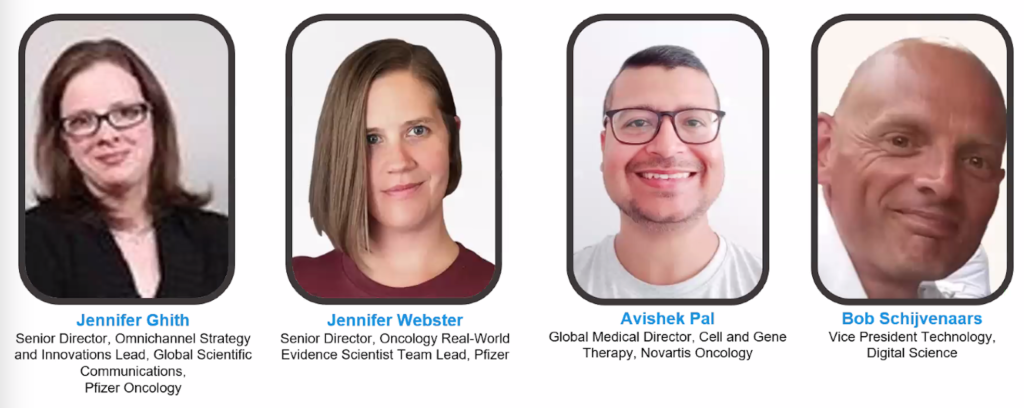What Does AI Mean for the Future of Healthcare Communication?
// By Wendy Margolin //
 In the brave new world of ChatGPT, most healthcare communicators and medical writers waver between somewhat nervous and cautiously optimistic.
In the brave new world of ChatGPT, most healthcare communicators and medical writers waver between somewhat nervous and cautiously optimistic.
If a pharmaceutical researcher asks ChatGPT about a drug’s efficacy, is that considered a clinical trial? Does it need to be filed on ClinicalTrials.gov?
These were the provocative questions that Jennifer Webster, senior director, oncology real-world evidence scientists team lead at Pfizer, asked a group of medical writers attending a February webinar for ISMPP, the global professional society for medical communication professionals.
That she even posed the question indicates how much today’s sophisticated artificial intelligence will change every industry of work — especially healthcare.
Webster’s answer? “Yes, and someday there will be metadata standards for reporting these types of studies.”
Outside of the tech world, many who were only recently introduced to ChatGPT late last year are feeling whiplash. Marketers on social media tirelessly discuss it, expressing a mix of awe and admiration.
AI has been in use for years, but the possibility of the technology dramatically changing the way we work and live was reserved for science fiction movies.
Not anymore. The technological abilities of AI in 2023 go way beyond IBM Watson winning Jeopardy. Marketers and communicators from across the healthcare spectrum ponder the implications, assess the risks, and test the brakes on what feels like a runaway train.
And ChatGPT itself weighs in on its potential to transform healthcare marketing in the article that follows.
What is ChatGPT and how has its recent release changed work already?
ChatGPT was released to the public on November 30, 2022. It gained more than a million users within five days. Since then, there are already more than 100 million users. It’s the fastest-growing consumer application in history, beating out Netflix and Facebook.
The application is so popular that users are often told to check back later because the site is too busy. Within two months, the company released a subscription plan.
ChatGPT from OpenAI is named for the language model that powers it — generative pre-trained transformers. Google released its own conversational AI rival, Bard, on February 8. In that big reveal, Twitter users found a mistake in the output shown in the announcement.
Clearly, there’s still work to be done, but conversational AI is only going to explode.
What makes conversational AI so powerful is the way it provides real-time, relevant responses to queries that are personalized, intelligent, and even thorough. In only seconds, the bot can provide a thoughtful response to just about anything.
Jennifer Ghith, senior director of omnichannel strategy and innovations lead, global scientific communications at Pfizer Oncology, demonstrates the way ChatGPT customizes responses to each specific user by asking the AI to explain itself to a scientist and a physician.
Ghith says, “If it replies to a scientist, it says that it summarizes papers, that it can generate abstracts, that it can create natural language explanations of scientific concepts. When it explains itself to a physician, it says it allows you to increase efficiency and productivity, but also to provide more accurate information to patients by generating easy-to-understand explanations of medical information. So, whether you agree with those capabilities or not, the responses are quite remarkable.”
Within a few moments of use, it’s clear that this technology will change education, healthcare, research, marketing, and more.

In a February webinar for ISMPP, the global professional society for medical communication professionals, these pharma and tech leaders presented “The Rise of ChatGPT and Generative AI: Implications for Medical Writing, Authorship, Content Development and QA Systems.”
How will ChatGPT change healthcare communications?
To determine how ChatGPT has made its mark on healthcare marketing, I asked the bot itself. Here’s the response:
Chatbot AI has the potential to greatly impact healthcare marketing in several ways:
- Improved Customer Experience: Chatbots can provide personalized and immediate support to patients and customers, making it easier for them to find the information they need and receive prompt answers to their questions. This can lead to an improved customer experience and increased customer satisfaction.
- Increased Engagement: Chatbots can be used to engage with patients and customers in real-time, providing relevant and up-to-date information about health conditions, treatments, and services offered by healthcare providers.
- Efficient Lead Generation: Chatbots can collect and analyze data about potential patients and customers, providing valuable insights for healthcare providers. This information can be used to create targeted marketing campaigns and reach out to individuals who are most likely to be interested in the services offered.
- Cost-Effective Solution: Chatbots are a cost-effective solution for healthcare organizations, as they can handle large volumes of inquiries without the need for additional staff. This can lead to significant cost savings for healthcare providers.
- 24/7 Availability: Chatbots are available 24/7, allowing healthcare providers to offer support and information to patients at all times. This can help improve the customer experience and build trust with patients.
Avishek Pal, global medical director, cell and gene therapy at Novartis Oncology, explains some common uses of ChatGPT for healthcare content and medical research as follows:
- Generate outlines/rough text, figures, and tables
- Generate basic literature summaries
- Generate ideas, concepts, search strategies
- Prototype FAQ-based Chatbots
- Fine-tune plain text/design creation
- Surrogate user-test for readability, design, SEO.
Most important, he adds, “Have fun!”
So, for fun, I asked Chatbot for a rap on how AI will change healthcare:
Verse 1:
Listen up y’all, it’s time for a change
In the healthcare world, things are starting to arrange
With AI by our side, we’re breaking new ground
Revolutionizing the way that healthcare is found
Chorus:
AI, AI, transforming the scene
Making healthcare better, more efficient, and lean
Patients get the help they need, night or day
AI is here to stay
Verse 2:
Gone are the days of endless wait times
With AI, we’re leaving those headaches behind
Chatbots provide personalized care
Answers to your questions, always there
The Risks of AI in Healthcare Communications
For every opportunity that comes with AI, there’s a counter-challenge. Several of these could have a potential impact on healthcare communications. Some possible risks include the following:
Authoritative Misinformation
Ghith perfectly describes the absurdity of some of the false responses ChatGPT offers, saying “ChatGPT hallucinates. It writes seemingly coherent and clever answers that can be completely wrong.”
As proven in the pandemic, misinformation in healthcare can erode trust and have devastating consequences.
The consequences of inaccurate content are massive. AI expert Gary Marcus on The Ezra Klein Show explains, “Imagine [fake answers] on a much bigger scale, the scale where you can’t trust anything on Twitter or anything on Facebook or anything that you get from a Web search because you don’t know which parts are true and which parts are not.”
Too Much Meaningless, Boring Content
Marketers are already guilty of diluting the web with boring content to rank in SEO. It’s only a matter of time before many use ChatGPT to create clusters of blog content around topics to improve ranking.
Nefarious actors can do this around fake medical information. Marcus warns, “We are leaning towards that dark world.”
Creators of AI will need to find ways to put guardrails around disinformation and misinformation. This is especially important as AI learns from itself, creating a continuous loop of lies.
Implicit Biases
Conversational AI today is built on information from training data and algorithm design. Just like humans, ChatGPT can generate racist, sexist, or bigoted text.
Inundated Peer Review System
Bob Schijvenaars, vice president technology at Digital Science, says fake papers can stress the already overwhelmed peer review system. “In scientific literature, it’s going to be harder to detect low-quality papers that are basically automatically generated because there will be so many. We run the risk of flooding preprint services with these fake papers.”
Job Replacement
After seeing ChatGPT write a blog in seconds, it’s clear that AI will make an impact on the job market. Some roles could be eliminated, and new jobs will likely arise.
Lack of Empathy
AI can be a great building block for healthcare marketing content, but leaning too heavily on technology can lead to content that lacks empathy and humanity. To avoid this, healthcare marketers will need to focus on creating original content based on subject matter experts’ knowledge, experience, and stories.
Below are four tips for creating effective content that will continue to be effective in the AI age:
- Use a subject matter expert’s name in the byline
- Add a point of view that’s unique to your organization
- Share stories
- Share data specific to your organization.
Where is AI for healthcare communications headed?
The capabilities of language models will change in unexpected ways as they continue to grow exponentially. But as powerful as ChatGPT is at providing responses, its impact on the way we work and live leaves us with more questions than answers, including:
- Should ChatGPT be listed as an author in research? (Spoiler alert, it’s already happened!)
- Are there copyright issues?
- Is it plagiarism?
- If you heavily edit the output, do you still cite it?
- How will jobs change?
Time will only tell where artificial intelligence takes us. In the meantime, most healthcare communicators and medical writers waver between somewhat nervous and cautiously optimistic.
As owner of Sparkr Marketing, Wendy Margolin helps busy healthcare marketing communications teams create more content. She’s on a mission to build a better medical web, one article at a time. Her favorite form of content is hospital brand journalism, which ties together her 20-year career in journalism, marketing, and healthcare.

